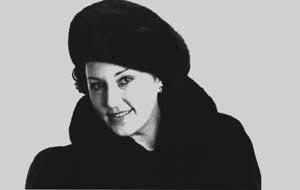|
|
 - London, Covent Garden -
"The honeyed-silk sheen of Tomowa's soprano,
with it's gorgeously musky lower register
and seductive beat, is for me one of the joys of our operatic
age... Purely vocally there were countless moments to treasure:
the sugar-sweet sustained G-sharp on the 'Silberne Rose' ; the
long-held 'in dem Wie' , and infinitely expressive pause before
'da liegt der ganze Unterschied'; above all the trio...which
built to a climax...with a fierce crescendo through the A-flat
and a fortissimo B-natural that must have set every chandelier
in the house rattling. ... Those great dark eyes spoke volumes
when she reproved her hairdresser, and at the first-act curtain
when she gazed motion-less into the auditorium, holding the house
breathless. ... One last memory: the change in tone color between
'Er soll jetzt gehn', and 'Er soll mich lassen' in the first
finale - what tenderness and regret! A great, great performance."
Rodney Milnes - Opera, May 1995
- London, Covent Garden -
"The honeyed-silk sheen of Tomowa's soprano,
with it's gorgeously musky lower register
and seductive beat, is for me one of the joys of our operatic
age... Purely vocally there were countless moments to treasure:
the sugar-sweet sustained G-sharp on the 'Silberne Rose' ; the
long-held 'in dem Wie' , and infinitely expressive pause before
'da liegt der ganze Unterschied'; above all the trio...which
built to a climax...with a fierce crescendo through the A-flat
and a fortissimo B-natural that must have set every chandelier
in the house rattling. ... Those great dark eyes spoke volumes
when she reproved her hairdresser, and at the first-act curtain
when she gazed motion-less into the auditorium, holding the house
breathless. ... One last memory: the change in tone color between
'Er soll jetzt gehn', and 'Er soll mich lassen' in the first
finale - what tenderness and regret! A great, great performance."
Rodney Milnes - Opera, May 1995
 - Chicago - Lyric Opera -
"The performance reached it's musical apex, as
all great ones must, in the famous third-act trio, where Anna
Tomowa-Sintow, as the Marschallin, gently voiced her resolve
to renounce her young lover... I doubt that neither of the singers
in the past has created as warm, wise or immensely dignified
a portrait as Tomowa-Sintow. ... she made the princess' obsession
with aging and her philosophical acceptance of love's passing
understandable and undeniably poignant. She sang richly, sustaining
the long phrases with a generous, steady soprano, bringing remarkable
verbal point and bittersweet pathos to the first-act monoloque.
Her farewell to Octavian at the inn was a textbook example of
great operatic acting.
John von Rhein - Chicago Tribune, October 1989
- Chicago - Lyric Opera -
"The performance reached it's musical apex, as
all great ones must, in the famous third-act trio, where Anna
Tomowa-Sintow, as the Marschallin, gently voiced her resolve
to renounce her young lover... I doubt that neither of the singers
in the past has created as warm, wise or immensely dignified
a portrait as Tomowa-Sintow. ... she made the princess' obsession
with aging and her philosophical acceptance of love's passing
understandable and undeniably poignant. She sang richly, sustaining
the long phrases with a generous, steady soprano, bringing remarkable
verbal point and bittersweet pathos to the first-act monoloque.
Her farewell to Octavian at the inn was a textbook example of
great operatic acting.
John von Rhein - Chicago Tribune, October 1989
 "Standing head and shoulders above everyone was
the wonderfully distinguished and patrician Anna Tomowa-Sintow
as the Marschallin. A beautiful Junoesque woman, she moved and
behaved like a well-born princess. Every emotional transition
registered with the character, as she listened and reacted with
consummate dignity and grandeur. She used the text pointedly,
while pouring out a stream of gorgeous, satiny sound, culminating
in a deeply felt, radiant opening to the trio of the last act.
... Thank goodness for the show - saving Tomowa-Sintow. The show
belonged to her."
Jason T. McVicker - October 1989
"Standing head and shoulders above everyone was
the wonderfully distinguished and patrician Anna Tomowa-Sintow
as the Marschallin. A beautiful Junoesque woman, she moved and
behaved like a well-born princess. Every emotional transition
registered with the character, as she listened and reacted with
consummate dignity and grandeur. She used the text pointedly,
while pouring out a stream of gorgeous, satiny sound, culminating
in a deeply felt, radiant opening to the trio of the last act.
... Thank goodness for the show - saving Tomowa-Sintow. The show
belonged to her."
Jason T. McVicker - October 1989
 "Anna Tomowa-Sintow is the kind of Marschallin
you dream of, a woman too old to be young and too young to be
old. The developement of her character and moods...is a masterful
achievement. She can sing pages in which the voice of Lotte Lehmann
will always ring in my private ear, and achieve something that
is unmistakably high art and distinctively her own, yet perfectly
in harmony with her great predecessor."
Rober C. Marsh - Chicago Sun Times - October 1989
"Anna Tomowa-Sintow is the kind of Marschallin
you dream of, a woman too old to be young and too young to be
old. The developement of her character and moods...is a masterful
achievement. She can sing pages in which the voice of Lotte Lehmann
will always ring in my private ear, and achieve something that
is unmistakably high art and distinctively her own, yet perfectly
in harmony with her great predecessor."
Rober C. Marsh - Chicago Sun Times - October 1989
 - Salzburger Sommerfestspiele -
"Anna Tomowa-Sintow stehen dafür gestische
und mimische Mittel von feinster Noblesse zu Gebote. Da spürt
man mit einem Mal auch ganz unmittelbar die Hofmannstahl'sche
Poesie, in einer überlegten Diktion, in einem schönem,
berührenden Wechselspiel von Aktion und Reaktion, in Nuancen
und Facetten, die sich schließlich mit dem gesanglichen
Vortrag in harmonischem Einklang bringen lassen. Der Abend gehörte,
spätestens ab dem Lever, der Marschallin, gehörte Anna
Tomowa-Sintow."
Die Presse - August 1984
- Salzburger Sommerfestspiele -
"Anna Tomowa-Sintow stehen dafür gestische
und mimische Mittel von feinster Noblesse zu Gebote. Da spürt
man mit einem Mal auch ganz unmittelbar die Hofmannstahl'sche
Poesie, in einer überlegten Diktion, in einem schönem,
berührenden Wechselspiel von Aktion und Reaktion, in Nuancen
und Facetten, die sich schließlich mit dem gesanglichen
Vortrag in harmonischem Einklang bringen lassen. Der Abend gehörte,
spätestens ab dem Lever, der Marschallin, gehörte Anna
Tomowa-Sintow."
Die Presse - August 1984
 - Wiener Staatsoper -
"Rosen für die Marschallin"
"Diesmal freilich war es Anna Tomowa-Sintow allein,
der man hätte Rosen streuen müssen. Mein Gott, was
für eine Marschallin! Sie hat sich diese Partie auf eine
Weise zu eigen gemacht, wie es bisher bestenfalls einem halben
Dutzend ihrer Vorgängerin gelungen ist. Jede Nuance stimmt
an dieser bezauberndsten Frau, die Strauss und Hofmannstahl je
erfanden."
Die Presse - Dezember 1991
- Wiener Staatsoper -
"Rosen für die Marschallin"
"Diesmal freilich war es Anna Tomowa-Sintow allein,
der man hätte Rosen streuen müssen. Mein Gott, was
für eine Marschallin! Sie hat sich diese Partie auf eine
Weise zu eigen gemacht, wie es bisher bestenfalls einem halben
Dutzend ihrer Vorgängerin gelungen ist. Jede Nuance stimmt
an dieser bezauberndsten Frau, die Strauss und Hofmannstahl je
erfanden."
Die Presse - Dezember 1991
 - Hamburger Staatsoper -
"...gewiss eines der attraktivsten Damen-Terzette
auf der Staatsopernbühne, angeführt von der Feldmarschallin
Anna Tomowa-Sintow: einer Grande Dame von Adel und Distinktion,
die gleichsam nur mit der Augenbraue regiert, äusserst diskret,
sowohl was ihre 'Affären' und ihre Gefühle als auch
das Singen selbst betrifft. Kein dramatischer Aus- und Zusammenbruch
am Ende des 1. Aktes, nur ein behutsames, einsichtiges Abdecken
des Handspiegels - ein überlegener, keineswegs resignierender
Schlußabgang: eine Frau von Welt (-Klasse). ... Viel Beifall,
der sich auf die Marschallin konzentrierte."
Hamburger Abendblatt - Februar 1989
- Hamburger Staatsoper -
"...gewiss eines der attraktivsten Damen-Terzette
auf der Staatsopernbühne, angeführt von der Feldmarschallin
Anna Tomowa-Sintow: einer Grande Dame von Adel und Distinktion,
die gleichsam nur mit der Augenbraue regiert, äusserst diskret,
sowohl was ihre 'Affären' und ihre Gefühle als auch
das Singen selbst betrifft. Kein dramatischer Aus- und Zusammenbruch
am Ende des 1. Aktes, nur ein behutsames, einsichtiges Abdecken
des Handspiegels - ein überlegener, keineswegs resignierender
Schlußabgang: eine Frau von Welt (-Klasse). ... Viel Beifall,
der sich auf die Marschallin konzentrierte."
Hamburger Abendblatt - Februar 1989
 - Maggio Musicale Firenze - Florence
-
"Il fascinoso canto della Marescialla"
La Repubblica - June 1989
- Maggio Musicale Firenze - Florence
-
"Il fascinoso canto della Marescialla"
La Repubblica - June 1989

 - London, Covent Garden Opera -
"Anna-Tomowa-Sintow war eine Kaiserin von imponierender
Größe und warmer Menschlichkeit. Seit ihrem Rollendebüt
in Bonn vor zwei Jahren, hat sie die Partie nun ganz zu eigen
gemacht und jener ersten Interpretation viele neue Facetten im
stimmlichen und szenischen Ausdruck hinzugewonnen. War schon
ihre Traumszene im 2. Akt von fesselnder Spannung, gelang ihr
mit bühnenbeherrschender Präsenz und tief bewegender
Ausstrahlung eine nochmalige Steigerung bei den großen
Monologen im Finalakt: erregend und mit fulminanten Spitzentönen
die Trennung von der Amme (ihr Ausbruch "Du taugst nicht
zu mir!" war einer der überwältigsten Augenblicke
des Abends) sowie mit berührend zarten Piani und verinnerlichter
Schlichtheit die Szene "Vater, bist Du's" eine unvergeßliche
Interpretation, mit der die Sängerin ihre bisherige Karriere
krönte"
Bernd Hoppe - Orpheus - Februar 1993
- London, Covent Garden Opera -
"Anna-Tomowa-Sintow war eine Kaiserin von imponierender
Größe und warmer Menschlichkeit. Seit ihrem Rollendebüt
in Bonn vor zwei Jahren, hat sie die Partie nun ganz zu eigen
gemacht und jener ersten Interpretation viele neue Facetten im
stimmlichen und szenischen Ausdruck hinzugewonnen. War schon
ihre Traumszene im 2. Akt von fesselnder Spannung, gelang ihr
mit bühnenbeherrschender Präsenz und tief bewegender
Ausstrahlung eine nochmalige Steigerung bei den großen
Monologen im Finalakt: erregend und mit fulminanten Spitzentönen
die Trennung von der Amme (ihr Ausbruch "Du taugst nicht
zu mir!" war einer der überwältigsten Augenblicke
des Abends) sowie mit berührend zarten Piani und verinnerlichter
Schlichtheit die Szene "Vater, bist Du's" eine unvergeßliche
Interpretation, mit der die Sängerin ihre bisherige Karriere
krönte"
Bernd Hoppe - Orpheus - Februar 1993
 "Anna Tomowa-Sintow war eine glänzende Kaiserin
und bot ein Paradebeispiel feinfühligen Schöngesangs."
"Anna Tomowa-Sintow war eine glänzende Kaiserin
und bot ein Paradebeispiel feinfühligen Schöngesangs."
Elizabeth Thomas - Welt am Sonntag - 29. November 1992
 "Anna-Tomowa-Sintow made a most welcome return
to the Royal Opera. The part of the Empress is ideally suited
to the burnish gold of a voice at its peak."
Graeme Kay - Opera Now - January 1993
"Anna-Tomowa-Sintow made a most welcome return
to the Royal Opera. The part of the Empress is ideally suited
to the burnish gold of a voice at its peak."
Graeme Kay - Opera Now - January 1993
 "There is some exceptionally fine singing, especially
from Anna Tomowa-Sintow as the Empress, the shadowless woman
of the title. I have no wish to be accused of sexism, but there
is a vibrancy to her clean, lissome soprano that breathes the
very essence of femininity, allied to a dignity of bearing and
an indefinable spiritual purity that shines from her every gesture.
And she matches Haitink in musical instinct, pouring forth phrase
after sculpted phrase of sumptuous beauty throughout."
Rodney Milnes - The Times - November 18, 1992
"There is some exceptionally fine singing, especially
from Anna Tomowa-Sintow as the Empress, the shadowless woman
of the title. I have no wish to be accused of sexism, but there
is a vibrancy to her clean, lissome soprano that breathes the
very essence of femininity, allied to a dignity of bearing and
an indefinable spiritual purity that shines from her every gesture.
And she matches Haitink in musical instinct, pouring forth phrase
after sculpted phrase of sumptuous beauty throughout."
Rodney Milnes - The Times - November 18, 1992
 "...Anna Tomowa-Sintow is spell-binding in the
title role...when she came to her moment of decision in Act 3,
her soprano burst through the orchestra like burnished gold.
She is a treasurable artist, heart-meltingly vulnerable and humane
in the opera's pivotal role."
"...Anna Tomowa-Sintow is spell-binding in the
title role...when she came to her moment of decision in Act 3,
her soprano burst through the orchestra like burnished gold.
She is a treasurable artist, heart-meltingly vulnerable and humane
in the opera's pivotal role."
Hugh Canning - The Sunday Times - November 22, 1992
 "Anna Tomowa-Sintow is a radiant, captivatingly
humane, infinitely compassionate Empress."
"Anna Tomowa-Sintow is a radiant, captivatingly
humane, infinitely compassionate Empress."
Robert Henderson - The Daily Telegraph - November 18, 1992
 "The central role of the Empress suits Anna Tomowa-Sintow's
technique and professional stature ideally. Her interpretation
grew in conviction and persuasiveness as the over four-hour-long
opera progressed, until the deeply moving revelations of the
scene with the almost stone Emperor.
"The central role of the Empress suits Anna Tomowa-Sintow's
technique and professional stature ideally. Her interpretation
grew in conviction and persuasiveness as the over four-hour-long
opera progressed, until the deeply moving revelations of the
scene with the almost stone Emperor.
This epic, beautiful performance is the best thing Tomowa-Sintow
has done here.
Tom Sutcliffe - The Guardian - November 18, 1992
 "Her voice, in prime condition, fills out the
line with a natural amplitude that betokens a wonderful directness
of stage personality. I love her uncloying tenderness in the
little scene with Barak, and the unmannered nobility of her demeneour
in the Trial - the climatic spoken outburst, usually cut, is
superbly handled."
"Her voice, in prime condition, fills out the
line with a natural amplitude that betokens a wonderful directness
of stage personality. I love her uncloying tenderness in the
little scene with Barak, and the unmannered nobility of her demeneour
in the Trial - the climatic spoken outburst, usually cut, is
superbly handled."
Max Lopert - The Financial Times - November 18, 1992
 "Anna Tomowa-Sintow's Empress, freezingly beautiful,
meltingly expressive in front of her stone husband."
"Anna Tomowa-Sintow's Empress, freezingly beautiful,
meltingly expressive in front of her stone husband."
Tom Sutcliff - Opera News - March 13, 1993
 - Opéra Marseille -
"Anna Tomowa-Sintow s'est relevée comme
la seule Impératrice capable de prendre l'impossible succession
de Rysanek. Non seulement elle chante le rôle magnifiquement
mais elle réussit à l'humaniser, à le rendre
émouvant par une expressivité et une sensibilité
difficiles a faire passer dans cet emploi. Bravo!"
- Opéra Marseille -
"Anna Tomowa-Sintow s'est relevée comme
la seule Impératrice capable de prendre l'impossible succession
de Rysanek. Non seulement elle chante le rôle magnifiquement
mais elle réussit à l'humaniser, à le rendre
émouvant par une expressivité et une sensibilité
difficiles a faire passer dans cet emploi. Bravo!"
M. Barichella - Semaine des Spectacles - October 25, 1995
 "Anna Tomowa-Sintow, Impératrice ... impériale:
Ses sons filés nous ont rappelé la pureté
infaillible de ceux que l'on croyait unique de Montserrat Caballé:
son invocation ultime comme sa première prière
au Faucon nous ont transporté dans le 'Monde d'En Haute'.
Quant à la somptuosité de son medium, elle a donné
à l'irréversible 'Je ne veux pas…boire l'eau
de la vie…' toute sa pathétique grandeur tragique.
Impératrice auréolée de grâce, casquée
de blondeur diaphane et gosier de cristal et d'éclat,
la diva n'est redescendu sur terre que pour recevoir uns salve
de vivats."
Edmée Santy - Le Provençal
- October 20, 1995
"Anna Tomowa-Sintow, Impératrice ... impériale:
Ses sons filés nous ont rappelé la pureté
infaillible de ceux que l'on croyait unique de Montserrat Caballé:
son invocation ultime comme sa première prière
au Faucon nous ont transporté dans le 'Monde d'En Haute'.
Quant à la somptuosité de son medium, elle a donné
à l'irréversible 'Je ne veux pas…boire l'eau
de la vie…' toute sa pathétique grandeur tragique.
Impératrice auréolée de grâce, casquée
de blondeur diaphane et gosier de cristal et d'éclat,
la diva n'est redescendu sur terre que pour recevoir uns salve
de vivats."
Edmée Santy - Le Provençal
- October 20, 1995
 |
|
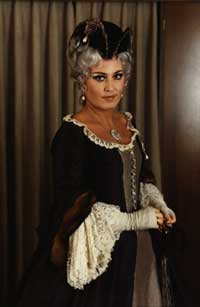
Der Rosenkavalier - Marschallin
Vienna State Opera
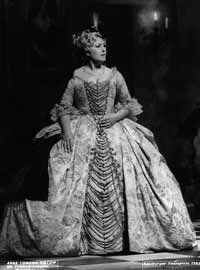
Der Rosenkavalier - Marschallin
Salzburg Summer Festival
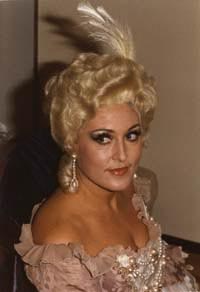
Der Rosenkavalier - Marschallin
Metropolitan Opera
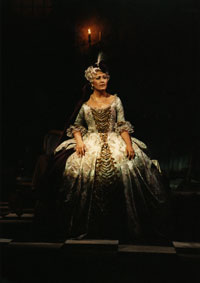
Der Rosenkavalier - Marschallin
Salzburg Summer Festival
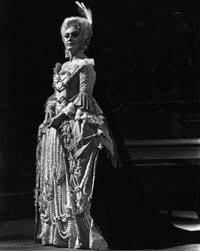
Der Rosenkavalier - Marschallin
Metropolitan Opera
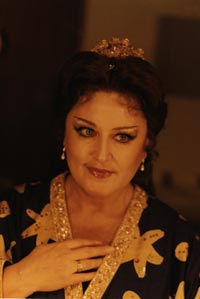
Die Frau ohne Schatten - Empress
London - Covent Garden
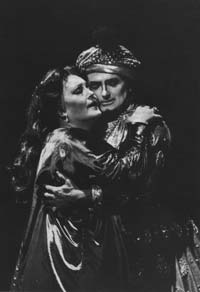
Die Frau ohne Schatten - Empress
(with Paul Frey)
London - Covent Garden
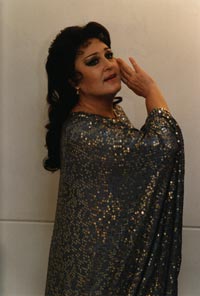
Die Frau ohne Schatten - Empress
London - Covent Garden
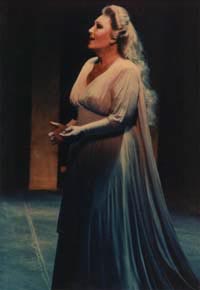
Die Frau ohne Schatten - Empress
Opera Marseille |
|




